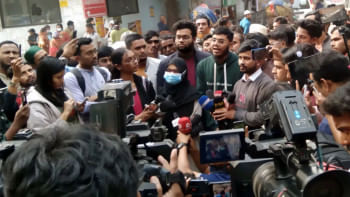The sinister collaborators of 1971
The death sentence awarded to Motiur Rahman Nizami, the topmost Jamaat leader for crimes committed against humanity in 1971 by the apex court, should come as no surprise. Though belated, the notorious schemer and planner of several murders of freedom loving Bangalis during the nine month long liberation struggle has finally been exposed.
The Bangali collaborators of 1971 accused of committing crimes against humanity do not deserve any mercy because they actively assisted the Pakistan occupation army in the destruction of the Bangali people. Quite clearly, the then Pakistan government deliberately undertook an annihilatory process in which collaborators like Motiur Rahman Nizami were complicit. There was no moral barrier that stood in the path of our destruction. The dilemma, if any, facing the Pakistani military junta related only to timing and logistical feasibility.
In 1971, during the course of our national liberation struggle, all moral obstructions to mass murder had broken down and a rationale for 'wholesale' killing of the Bangalis was established. In fact, Bangalis were brutally mistreated in a barbarous way.
As far as evidentiary credibility is concerned, it is only proper to say that informed citizens everywhere in the world drew appropriate conclusions about what was happening in East Pakistan in 1971, reinforced by eye witness testimonies of those still alive.
To recollect and appreciate the tragic happenings of 1971 in the then East Pakistan, one must recognise that the full extent of the Bangali genocide became understood painfully, slowly. Quite late in the day, it became manifest that the Bangalis of East Pakistan had fallen victim to mass murder. The ordeal left many survivors homeless and dispossessed.
In 1971, while some Bangalis scaled summits of courage and nobility, there were shameless collaborators who plumbed depth of evils in a fashion that compels the awe of posterity. Amongst many present day citizens of Bangladesh, to whom serious hardship and collective peril are unknown, the tribulations that millions endured in the fateful nine months of 1971 are almost beyond comprehension. It was a contest between good and evil that imposed monumental misery upon so many.
It is also worth pondering that only a tiny fraction of those guilty of crimes against humanity in 1971 have been indicted. This is partly because the victors had no stomach for the scale of executions, numbering several thousands, which would have been necessary had strict justice been enforced against every criminal accused of crimes against humanity. Very few retributive executions took place in liberated Bangladesh. Students of history may like to compare this with events of post-World War II in Europe, where nearly a thousand retributive executions took place in the western zones of occupation. Some 920 Japanese were executed, more than three hundred of them by the Dutch, for crimes committed in the East Indies.
The post-liberation generation of Bangladesh needs to know that the Bangali villains and criminals of 1971 had not been held to account for their misdeeds for a long time, owing to factors better left unsaid. That, however, cannot be grounds for exonerating the sinister collaborators from charges framed later. There is also no reason to show mercy to these evil characters on account of their age, because they have proved their incorrigibility by words and wishes. These criminals do not show any remorse or regret even now.
The frail looking characters waiting in the docks with drooping posture must not make us forget the gory crimes they committed in full public view in complete disregard of morals and scruples. Their actions turned countless women into widows and scores of children into orphans. A particular faith became a nightmarish burden for a sizeable population due to their perverted fanaticism.
Believers know full well that patriotism is an inseparable part of faith. That being so, persons accused of crimes against humanity in 1971 have quite manifestly defied and defiled their own faith. They deserve no compassion and consideration, morally or legally.
Recollecting the gory incidents of 1971, it could justifiably be said that mass murders on a fearsome scale began immediately after the carnage of March 25 in Dhaka. Even as Pakistan army's military predicament worsened, the pace of slaughter of Bangalis did not slow down. The foremost aspiration of the occupation army was to produce mass death and thus their Bangali collaborators were willing to murder vast numbers of innocents in cold blood. Motiur Rahman Nizami may not himself have killed, but he was happy to acquiesce in, and even enthuse about, others doing so.
The writer is a columnist of The Daily Star.


 For all latest news, follow The Daily Star's Google News channel.
For all latest news, follow The Daily Star's Google News channel. 








Comments